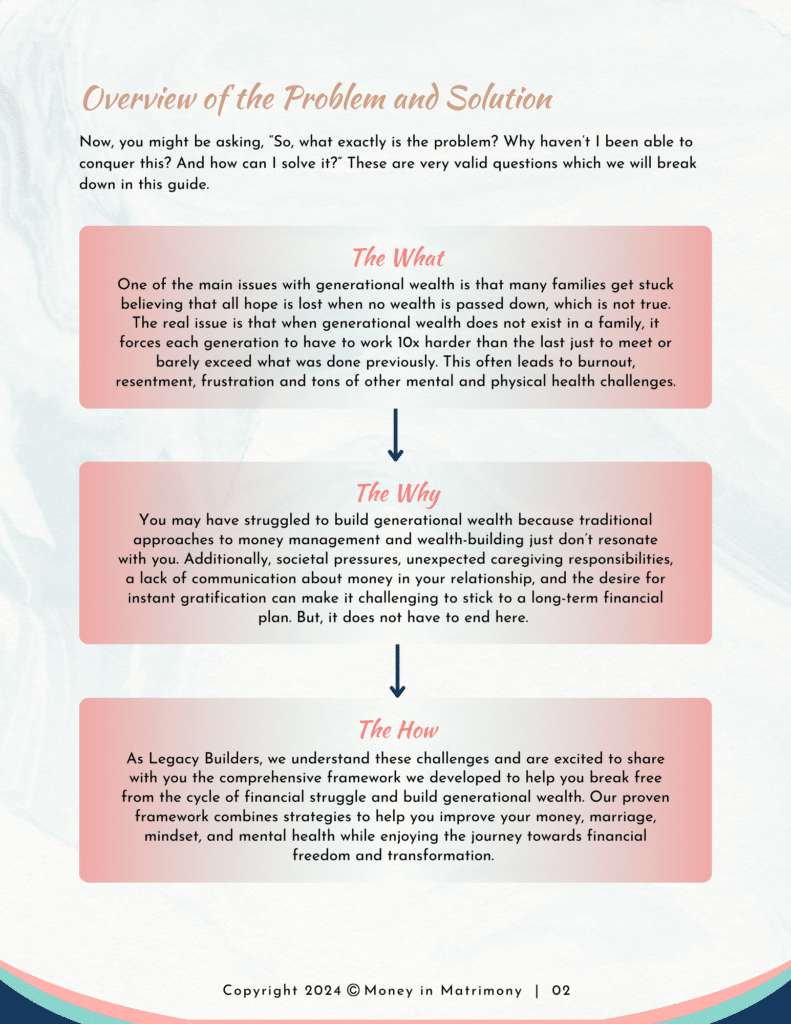25 Money Management Tips for Newly Married Couples
This post may contain affiliate links which means that I will receive a small commission for purchases made through those links, at no cost to you.

Marriage is very rewarding, but it does require lots of work. Then adding money to the mix creates a different level of complexity. So, in order to navigate the union of marriage and money, I’ve compiled a list of 25 money management tips for newly married couples that I’ve learned over the past 13 years of marriage.
Today, as I write this article, I celebrate 13 years of marriage to my middle school sweetheart. Over the years, we have learned so much about ourselves and each other. While it has not always been an easy road, it has definitely been worth it. We married at the tender ages of 22 and 23, so needless to say, we definitely had our share of money problems. However; there are a few lessons we learned about money management over the past 13 years that have just stuck with us. Let’s go ahead and dive right in!
.
25 MONEY MANAGEMENT TIPS FOR NEWLY MARRIED COUPLES
.
1. UNDERSTAND YOUR MONEY MINDSET
Understanding both your and your spouse’s money mindset is important because past influences have the ability to affect current decisions. They will determine the actions you take as it relates to money. It ultimately tells a story and helps you to figure out how your life has been affected by your thoughts and beliefs about money. Truly understanding your mindset might help you to get clear on why you get stressed when trying to make huge financial decisions, which ultimately will benefit your spouse as well. Unfortunately, it’s hard to make any progress if you don’t truly understand what and why you believe what you do about money.
2. Establish shared financial goals
One of the biggest ways to create tension in a marriage is to have different financial goals. If couples want to succeed financially, then each person must agree with these goals. These financial goals must be aligned and include all of the elements of SMART goals. They must be Specific, Measurable, Attainable, Realistic, and Timely. If your shared goals are not aligned, it will be difficult for each spouse to get on the same page.
3. Schedule frequent money dates
A money date is a specific time set aside for you and your spouse/partner to discuss money. The purpose of these dates is to ensure that both of you are on the same page as it relates to your personal finances. This can be done at home in your kitchen over dinner, on your back patio, or wherever you choose, as long as it’s somewhere private. Talking points can include financial goals, values, priorities, money mindset, spending plan, etc. However; if this is your very first money date, start by discussing the big picture items first.
Then, on the second money date (which should happen shortly after the first date), talk about your spending plan or budget. This way you can ease into any tough money conversations. These dates should occur as often as you need them to, whether it’s once each week or twice each month. Don’t let the lack of communication with your spouse/partner keep you from reaching your financial goals! Things we don’t put in our calendars typically don’t get done! So, schedule your money date with your spouse/partner today.
4. Lay everything out on the table
The act of hiding money (including savings, debt) from your spouse, is referred to as financial infidelity. When you marry, you take on the income and debt of the other spouse and vice versa. So, you end up doing the marriage a disservice when you decide to keep money secrets. Don’t ruin your marriage by keeping financial surprises. It is important to be as honest and transparent as possible as it relates to any past and current savings, debt, etc.
5. Discuss financial boundaries
Financial boundaries are especially important because they allow couples to draw the line as it pertains to money. They serve as limits that provide guidance on what you should or should not do as it relates to money within your marriage. We have to know what’s acceptable or not acceptable and both partners must be in agreement with the decision. Creating boundaries is a must if we want to live a fulfilling life. Whenever we don’t set boundaries in every area of our lives, people or things tend to take advantage of our time, our money, and our personal space.

6. Live within your means
Only purchase that which you can afford. Each month (before the money comes in), each spouse should sit down together to discuss the spending plan or budget. You should include all of the absolute necessities along with a few items you want. However; you shouldn’t be buying expensive things to impress people who may not even like you. You will be upset with yourself in the end.
7. Avoid lifestyle creep
Most of our goals in life include some version of earning more income so that we can do more for ourselves and others. However; some get just a little bit carried away with this. Just because you begin to earn more money over time doesn’t mean you need to spend every hard-earned dollar. While I understand the importance of maintaining a certain standard of living, this does not mean that every time you get a raise, you have to buy a better car or a bigger house. Learn how to maintain your same standard of living while saving or investing the increase. This financial methodology will get you so much further in life.
8. Track your spending
Many times, the issue with budgeting is not that couples don’t know how to budget. It’s that they are totally unaware of how they are spending their money. You might be thinking that $20 here and there won’t make a big difference, but it actually will if these purchases haven’t been included in your spending plan. In order to determine the true amount of expenses for your household, do the following: ⠀⠀⠀
- Download an excel file of your last 2-3 bank statements.
- Search for recurring expenses.
- Write down a list of those expenses.
- Determine which are fixed, variable, and discretionary.
- Get rid of any budget busters.
If done consistently, you should notice improvements to your spending plan almost immediately.
9. Create a realistic spending plan
Each month (before the money comes in), each spouse should sit down together to discuss the spending plan. A spending plan is a strategy used to help you and your spouse manage your income and expenses. This should be done together with your spouse on your money date. Your spending plan should not be restrictive. In fact, it should include everything you need and want it to include as long as you can afford it. However; the latter is the key to making your spending plan work.
Make adjustments for expenses such as holiday, birthdays, other variable, or one-off type expenses that might not have been accounted for previously. If you can’t afford something, then you should either find ways to earn extra income or replace one expense with another. Sometimes including the items that we really want in our spending plans might mean that we may have to exclude the things we really don’t care about. And that’s okay! Only you can decide what’s important enough to be included in your spending plan. There is no one size fits all solution!
10. Combine your accounts
I know that this might be a very controversial topic. However; based on my own personal experience, I can honestly say that combining bank accounts has truly worked for my husband and I. Having all the bills paid from one account and all expenses being withdrawn from the same account just makes managing the money every month so much easier. Ultimately, the decision is up to you as to how you want to move forward with this. So please consider your own unique circumstance.
11. Automate bills
This was a game-changer in our marriage! You will save so much time if you learn to budget and automate your bills. I am the nerd in our household and I used to spend a few hours each month logging into several websites to manually pay bills. Once I set up payee accounts with our bank and told our bank how much to pay and when to send the payments each month, this lifted the burden off of me. So, I will forever be grateful for whoever created Bill Pay!
12. Shop new rates/promotions
Saving money at all costs is essential especially when you are both new to marriage and joint finances. Since I love to save money, I make it a point to contact each of our service providers every few months to ask if they can lower our bill by using any current promotions or provide us with a loyalty customer credit. Most times they will say yes, especially if you have made timely payments.
13. Wait 24 hours before making large purchases
Whenever you have a huge financial decision to make, it is always a good practice to go home, discuss it with your spouse, and then sleep on it. Once you’ve agreed on a decision, revisit it the next day. By following this financial tip, you can avoid buyer’s remorse by ensuring that whatever it is you are buying is really something that you need and want!
14. Educate yourself on financial topics
My husband and I are where we are today because we never stopped learning. The more we educate ourselves, the more we can keep ourselves from getting into a financial mess. There are so many free podcasts, books, and other sources of literature that discuss money management. Why not take the time to learn from people who have already made their share of mistakes so that you can avoid them?
15. Find ways to earn more income
Two (or more) incomes are better than one. Bringing in more money can take away some of the stress from your budget, especially if it doesn’t put a strain on your household. Consider picking up side jobs to help reach your financial goals. Also, consider creating new streams of income as a way to earn money as well.
16. Stop the comparisons
There’s a quote by Mark Twain that says “Comparison is the death of happiness.” This is so true! You were created to forge your own path which is different from any of the nearly 7.5 billion other people on earth. Comparing yourself to others steals your joy. It makes you think less of yourself. It’s never a good idea to base your self-worth on what others think of you. You limit yourself when you believe you should have what someone else has and it makes you buy silly things so that other people can be impressed with you. Keep your money for something else.
17. Forgive yourself for past financial mistakes
We’ve all done silly things with money. However; we must not continue to beat ourselves up about it. We have to learn to be thankful for where we are and for where we are going. Consider this as a fresh new starting point. Be thankful that you get the opportunity to embark on this new journey toward improving your finances. Stop. Breathe. Now, give yourself some grace.
18. Use cash
The use of debit cards allows us to overspend. While it is so easy to swipe your debit card, we found that using cash for items such as food, gas, groceries, and other personal expenses help to keep us within budget. A swipe here for one small item adds up if this is done multiple times each day or each week. As Benjamin Franklin once said, “Beware of little expenses. A small leak will sink a great ship.” So, I urge you to please consider using cash in order to stay within budget.

19. Stay informed of household finances
Each spouse should know passwords, due dates, bill payments, location of important documents, etc. Create a password-protected spreadsheet with this information so that the partner who is less involved with the monthly finances will know where to pick up if something was to happen to the other spouse.
20. Get rid of debt
A few months ago, my husband and I paid off all of our non-mortgage debt. Now, we are working to pay off the mortgage. If somebody had told me how rewarding it would be to get rid of debt, I think we would have done it over a decade ago! As soon as we got serious about paying off our six-figure debt, we immediately began to see our net worth increase. Paying off debt allows you to free up so much money and allows you to build wealth. However; don’t just take my word for it, try it out for yourself!
21. Celebrate financial milestones
Over the years, I realized that although my husband and I were reaching several financial goals, we never really took the time to celebrate. We would accomplish one goal and then move on to the next. I can’t remember exactly what sparked the change in mindset, but we both just decided that it was time to stop for a moment to smell the roses. We worked hard to accomplish each of our goals and they should all be celebrated. It doesn’t have to be anything over the top. However; if you want to treat yourself to a movie or nice dinner, that is absolutely appropriate.
22. Contribute at least UP to company match
Financial planning for newly married couples is extremely important. In particular, saving for retirement is one of the key ways to ensure that you can live the life you want after you retire.
However; when we don’t contribute up to the company match via our 401K or other forms of retirement, we end up losing out on money needed after retirement. This is FREE money! Why leave it on the table?
The goal of a retirement plan is to grow it as big as possible so that when you decide to stop working you will have a decent nest egg to live on. The company match helps to accelerate that growth. Please don’t sabotage your financial future by missing out on this match!
23. Plan for the future
Planning for the future is also going to be another key element at this stage of the game. In order to begin the process, set up free accounts for your emergency fund and additional accounts for specific items you know you will need to pay for in the future.
These additional accounts are typically referred to as sinking funds and should be set up to prevent you from having to default to borrowing loans or using credit cards to cover an emergency or expected expense. Each financial institution may require a different type of setup for these accounts. So do your own research to see how this will work with your bank or credit union.
24. Organize your financial documents
In the unlikely event of a disaster or emergency, most people cannot easily and quickly grab all of their financial documents. You won’t have time to go up to the attic or search through stacks of paperwork to find what you need. Hence, the reason why I created The Ultimate Emergency Financial Checklist. Use this document as a guide if you have no idea where to start when it comes to organizing your important documents.
25. Find a trusted tax professional
Allow a tax professional to advise you and your spouse on tax issues. Although it might be cheaper to handle your taxes yourself, as a new married coupled, you could end up owing thousands of dollars if you are not well versed in the current tax laws. So, do yourself a favor and hire a tax professional.
Final Thoughts
My goal with this post is to simply help married couples avoid the pitfalls made by my husband and I. If we had known some of the things we know now, we could have started our married life in a much better financial position. However; as I mentioned above, we must forgive ourselves for past financial mistakes and keep moving forward. I hope these 25 money management tips for newly married couples have empowered you to make some changes to your personal financial situation. Please feel free to share with any couples you know who could benefit from this.








